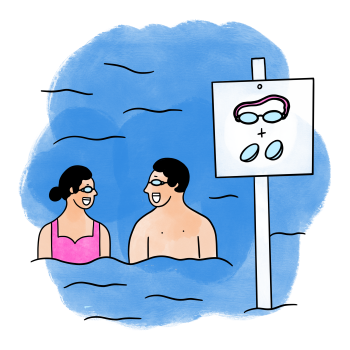Can I Swim Whilst Wearing My Contact Lenses?
We wouldn’t recommend it. If you choose to do so, however, there are ways to minimise any risk.
INVISIBLE NASTIES
When a lens bathes luxuriously in your freshly prepared contact lens case or sterile blister pack, it does so within a solution that keeps the material in perfect condition. When it’s in your eye, your tears and eyelids do a fantastic job, maintaining the lenses softness and protecting eye health.
However, a range of invisible nasties like bacteria, viruses, fungi and so on also love the company of contact lenses. Their role in life is to cause an infection, making them your eyes’ natural enemies. These microbes are particularly fond of warmish swimming pool water, which is why we use chlorine to remove them.
The problem is that chlorine isn’t good for your eyes or contact lenses. What’s more, it doesn’t kill all bugs - and unless changed regularly, swimming pool filters can be happy breeding grounds for things you’d rather not meet.
For example, you may have never encountered a bacterium by the name of Pseudomonas Aeruginosa, or a type of protozoan like the Acanthamoeba - and it’s best to keep it that way. These microscopic organisms have a habit of attaching themselves to contact lenses. Once glued on, they can cause the cornea to become infected. In rare but unpleasant circumstances, irritations and contaminations can then escalate to sight loss and lasting eye damage - especially if they find their way into tiny scratches on the surface of your eye.
MANAGE THE RISK
It’s ironic that most people are much more worried about losing a lens in a pool than picking up an infection. Both are rare events - and it’s important to stress that these types of infections are not likely to happen - but if your eyeball does collect a few unwelcome fellow travellers left by previous swimmers and fellow bathers, there could be serious consequences. On your body, they’ll do no harm at all. On your sensitive eyes, it may be a different story.
As for sea swimming, one villain is salt. The sea is full of the stuff - and it’s bound to irritate your eyes. Sea water also carries its share of micro-organisms. So if you decide to swim in the sea or a public pool with your contacts on, or soak in a hot tub whilst wearing your lenses, you need to minimise these risks.

If you’re determined to keep your lenses in whilst in or under water, we understand. It’s tempting. You may want to keep watch over a child, see below the surface or avoid the hassle of taking them out only to have to replace them after your swim. The option of wearing glasses while swimming isn’t appealing either: they will get wet, blurry and potentially lost.
In case you're determined to keep your lenses in, make sure you protect them and your eyes behind a pair of airtight goggles. This will reduce the risk of inflammation and infection and minimise the lesser possibilities of losing a lens - or stretching it out of shape.
If you normally wear glasses or are a daily contact lens wearer, you can further minimise the chances of infection by putting in a new pair of daily disposables before you swim. Then slip on your goggles and enjoy splashing around.
As soon as you finish your swim and leap dolphin-style out of the water, take out your contact lenses immediately and discard them. Then you can replace them with a fresh pair of daily disposable contact lenses or switch to your spectacles.
If you’re a monthlies or rigid gas permeable contact lens wearer, it’s a good idea to keep a stock of daily disposables for this purpose, leaving your regular lenses to soak in solution whilst you venture into the pool or hot tub.

CLARITY
And there’s one more alternative to consider. You can resolve the issue by getting a pair of prescription swimming goggles, or a prescription dive mask. This means the underwater world becomes as clear as the view above it, letting you swim, snorkel or even scuba drive with clarity. Problem solved!
BEST PRACTICE
To bring all of these options in focus, the best idea is not to wear lenses when swimming. If you decide to do so, minimise the risk, by wearing temporary daily disposable contact lenses, goggles, or both. And of course, if you do experience any irritation, redness, blurred vision or uncomfortable feelings in your eye after swimming, get in touch with your optometrist as soon as possible.
That way you’ll keep your eyes safe - and the bugs at bay!
References: 1. FACT SHEET: Pseudomonas aeruginosa.https://www.wsaa.asn.au/sites/default/files/publication/download/Fact%20Sheet_Pseudomonas_Aug16.pdf Accessed: 10/03/2021
ALWAYS READ THE LABEL AND FOLLOW THE DIRECTIONS FOR USE.
All content on this website is for informational purposes only, always talk to your health professional regarding your eye health or medical conditions.
Never disregard the advice of a medical professional.
